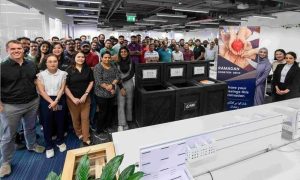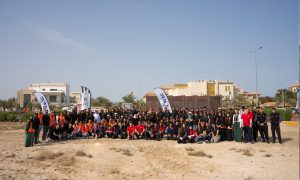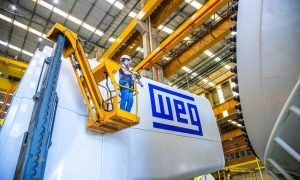Construction Alchemist
Big Project ME speaks to Peter Gaskin about his 30 years at the helm of construction chemical manufacturer the MCT Group

Dubai in the early 1980s was a very different city to today’s gleaming metropolis. While gigantic shopping malls and supertall buildings dominate the skyline in 2014, 35 years ago the most visible landmarks were the Dubai Clock Tower Roundabout and the World Trade Centre, marking opposite ends of Dubai.
Recent migrants to Dubai may take its infrastructure and logistics for granted now, but back then even getting to Abu Dhabi required a six-hour round trip.
It was this challenging environment that Peter Gaskin, CEO and group founder of the MCT Group of companies, walked into. He came to Dubai in 1981 having worked extensively in the European automotive industry, with absolutely no background in either the construction or chemical industries.
Having built the group into one of the largest locally-owned construction chemical manufacturers in the country, Gaskin sat down with Big Project ME to discuss the last three decades of his life with the company he founded, and the many challenges and tribulations he’s overcome during that time.
“I was head hunted to come out and set something up for somebody else, actually,” he reveals. “But then after three months, they decided they were going to pull out and not pursue the setting up of that business. However, the one good thing they did was introduce me to the owner of this group of companies.”
“The group is owned by HE Sheikh Saeed Mohammad bin Hasher Al Maktoum, and we’ve been together for 34 years. I do really appreciate the trust he puts in me, because I have basically built and run this company and he doesn’t get involved in it.
“The whole group has been built on very little investment originally, and without borrowing a lot of money from the banks. We came into the market initially at a time when it was very slow going, but after 1991 – when the First Gulf War took place – Dubai started to invest money into infrastructure and the UAE really started to build itself as a country. So that was when we had a time of constant growth and boom,” Gaskin reminisces.
Having started off life as the Marketing, Consulting and Technical (MCT) Group, the company established itself with a business relationship with a UK manufacturer, Belzona Polymerics, in 1982. In 2007, the company was restructured and the name was changed to Molecular Corrosion Technologies.
Gaskin says that he learnt a lot from that deal, including the importance of diversifying and spreading risk. As such, he led the drive to establish Corrosion Technical Services, a supplier of essential building materials to the UAE’s growing construction industry.
“The idea, basically, was that if we had a bad couple of years with the other side of the business, we would have something to back it up,” he asserts.
Having started out life as Corrosion Technical Services, Gaskin and his team decided in 2001 that the time was right for a rebrand of the subsidiary, given its expanding portfolio and the extensive growth within the construction industry. Corrotech Construction Chemicals was formed and quickly became a market leader in an increasingly competitive market.
Today, the MCT Group is divided into two divisions – Molecular Corrosion Technologies, which has branches in Dubai, and Mutawa Corrosioneering in Abu Dhabi. Corrotech Construction Chemicals has two branches in Dubai and Abu Dhabi, as well as subsidiaries SolarTech, Corrotech Building Maintenance and Parex, a former joint venture that MCT bought out earlier this year.
By 2007, the group had finished construction on two $16.3 million manufacturing plants in Dubai Investment Park. So it was clear that pre-2008, things were running smoothly for MCT, with the company registering an annual turnover of $45.73 million. That was about to change, however, as the Dubai property bubble burst, plunging the construction industry into chaos and uncertainty.
“Like many other businesses in Dubai, we suffered quite badly [during the downturn]. I think our turnover in the year before went down to about $18.5 million. We lost nearly two thirds of our business.
“We weren’t helped by the fact that one of the product lines we were running… we used to act as a marketing operation for another UAE-based company. That company eventually got bought out by another company, who decided to cancel our agreement. So we lost nearly $13.06 million worth of business, just on that one product line,” he says ruefully.
Despite the troubles they faced, Gaskin insists that none of his staff was made redundant during the crisis. He puts this down to the mutual respect and loyalty between MCT’s staff and management.
“The biggest asset any business owns is the people who work for it. If you don’t have their respect or loyalty, they’re not going to work for you.
“When people leave, they don’t leave companies, they leave people. My philosophy has been, all the way along, to find good people, empower them, tell them what I want and then let them get on with it. Don’t try and micromanage, because that doesn’t work.
“We provide our managers with financial information about how the business is doing. Without that, they wouldn’t know. A lot of other companies would try and keep that a secret, but we believe that unless you know how you’re doing and how you’re performing, you can’t make the right decisions,” the veteran CEO explains.
One example of his concern for the wellbeing of his staff is the efforts he’s personally taken to ensure that the labour force at MCT Group are looked after.
“We employ 298 people and a lot of them work on the maintenance side. We got fed up with the labour accommodation here, so we actually built our own labour accommodation for them. It’s actually to a standard that the Ministry of Labour has told everyone to come at look at it,” he says proudly.
Allied to this commitment to staff is a desire to create a culture of improvement. To this end, the group has invested in developing a training school and workshops to ensure that MCT staff are fully equipped to serve and support their customers.
This philosophy is being extended to the projects the MCT Group is supplying their materials to, with Gaskin revealing that an applications services division is being set up to ensure that best quality is delivered.
“We want our products to be used correctly. Most often when you have a failure on-site, for anything, it’s not the actual product that’s at fault. It’s the way it’s been applied. As such, we try to ensure that all our customers have fully trained staff.
“We bring our customers in, we do theoretical stuff in the classrooms and do practical stuff in the workshops. We don’t just want to sell our products, we want to support all our customers,” he explains.
“We will send supervisors on-site, depending on how big the project is. We’ve done stuff for ADGAS down in Abu Dhabi, we’ve had people offshore for two or three months at a time, just to ensure that everything is done correctly.”
In the wake of the downturn and the gradual recovery, Gaskin points out that major contractors are looking for their suppliers to take more responsibility on-site.
“Particularly with construction chemicals, the big contractors don’t want to appoint subcontractors. If somebody can take responsibility for the whole project, then they’re happier because they don’t want to deal with two or three different people or divisions, they just want to deal with one person.”
This attitude forms the core of Gaskin’s vision for the MCT Group. With the company looking to regain its foothold in the market, he’s determined to reshape perceptions, turning it from a mere product supplier to a service provider.
“We try not to just sell products. We want to sell a service. We try to back everything up, we want people to know that when they come to us, we’re not going to run away from any responsibility. We’re going to do our utmost to ensure customer satisfaction. During the downturn, a lot of companies actually stopped spending, but we actually invested and brought in a higher calibre of people, on higher salaries, to turn the situation around.”
However, as keen as Gaskin is to adapt, he’s quick to point out that there are major issues within the industry that need to be addressed, despite the gains made since the downturn.
“I think a lot of contractors here need to become a lot more professional with who they’re dealing with. We’ve done business with people who’ve disappeared overnight, for instance. It’s quite easy to promise someone that you can do a job and give them a 10-year guarantee on it, if you’re not going to be here next week, or the year after,” he says sardonically.
“These are the sorts of problems we’ve come across in the marketplace over here. Contractors need to become a little bit more professional about who they do their business with at the end of the day.”
Having been at the helm of the MCT Group for more than three decades, it’s only natural that Gaskin’s thoughts turn to the legacy he leaves behind. Given the likelihood that he’ll hand the reins over sooner rather than later, he’s keen to ensure that the values and methods he’s instilled remain behind.
“I think one of the strengths that I have is that I’m very instinctive about things. If I see something that I think has potential, then I will pick that up and throw everything at it to make sure it’s a success. If we’re going to take something on, as far as we’re concerned, we’re going to take the best shot we can possibly give it.
“So certainly, when I look around me, I’m very proud of what we’ve achieved. That alone means that I’ve been part of the development of Dubai.”













